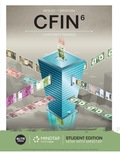On the day his baby was born, a father decided to establish a savings account for the child’s college education. Any money that is put into the account will earn an interest rate of 8% compounded annually. The father will make a series of annual deposits in equal amounts of $5,000 on each of his child’s birthdays from the 1st through the 18th, so that he can make withdrawals from the account on the child’s 18th birthday for child's college funds. Find the amount accumulated at the end of child's 18th birthday. (Also draw the cash flow diagram).
On the day his baby was born, a father decided to establish a savings account for the child’s college education. Any money that is put into the account will earn an interest rate of 8% compounded annually. The father will make a series of annual deposits in equal amounts of $5,000 on each of his child’s birthdays from the 1st through the 18th, so that he can make withdrawals from the account on the child’s 18th birthday for child's college funds. Find the amount accumulated at the end of child's 18th birthday. (Also draw the cash flow diagram).
Chapter5: The Time Value Of Money
Section: Chapter Questions
Problem 30P
Related questions
Question
On the day his baby was born, a father decided to establish a savings account for the child’s college education. Any money that is put into the account will earn an interest rate of 8% compounded annually. The father will make a series of annual deposits in equal amounts of $5,000 on each of his child’s birthdays from the 1st through the 18th, so that he can make withdrawals from the account on the child’s 18th birthday for child's college funds. Find the amount accumulated at the end of child's 18th birthday. (Also draw the cash flow diagram).

Transcribed Image Text:On the day his baby was born, a father decided to establish a savings account for the
child's college education. Any money that is put into the account will earn an interest
rate of 8% compounded annually. The father will make a series of annual deposits in
equal amounts of $5,000 on each of his child's birthdays from the 1st through the
18th, so that he can make withdrawals from the account on the child's 18th birthday
for child's college funds. Find the amount accumulated at the end of child's 18th
birthday. (Also draw the cash flow diagram).
Expert Solution
This question has been solved!
Explore an expertly crafted, step-by-step solution for a thorough understanding of key concepts.
This is a popular solution!
Trending now
This is a popular solution!
Step by step
Solved in 3 steps with 4 images

Knowledge Booster
Learn more about
Need a deep-dive on the concept behind this application? Look no further. Learn more about this topic, finance and related others by exploring similar questions and additional content below.Recommended textbooks for you

EBK CONTEMPORARY FINANCIAL MANAGEMENT
Finance
ISBN:
9781337514835
Author:
MOYER
Publisher:
CENGAGE LEARNING - CONSIGNMENT

Intermediate Accounting: Reporting And Analysis
Accounting
ISBN:
9781337788281
Author:
James M. Wahlen, Jefferson P. Jones, Donald Pagach
Publisher:
Cengage Learning


EBK CONTEMPORARY FINANCIAL MANAGEMENT
Finance
ISBN:
9781337514835
Author:
MOYER
Publisher:
CENGAGE LEARNING - CONSIGNMENT

Intermediate Accounting: Reporting And Analysis
Accounting
ISBN:
9781337788281
Author:
James M. Wahlen, Jefferson P. Jones, Donald Pagach
Publisher:
Cengage Learning



Cornerstones of Cost Management (Cornerstones Ser…
Accounting
ISBN:
9781305970663
Author:
Don R. Hansen, Maryanne M. Mowen
Publisher:
Cengage Learning
